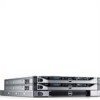Dell PowerVault NX3500 Administrator's Guide - Page 163
NFS Export Does Not Exist, NFS File Access Denied
 |
View all Dell PowerVault NX3500 manuals
Add to My Manuals
Save this manual to your list of manuals |
Page 163 highlights
NFS Export Does Not Exist Description Cause Workaround Attempted to mount an inexistent export. This failure is commonly caused by spelling mistakes on the client machine or when accessing the wrong server. 1 Check the available exports on the NAS, verify that all the required exports exist. 2 On the problematic client, verify that the relevant export is available to this client: % showmount -e Export list for : /abc 10.10.10.0 /xyz 10.10.10.0 3 If the export is available, review the export name spelling in the relevant mount command on the client. It is recommended to copy paste the export name from the showmount output to the mount command. NFS File Access Denied Description Cause Workaround This event is issued when an NFS user does not have enough permissions for the file on a NAS container. File ownership is UID/UNIX and the user is not privileged to access the file, or, file ownership is SID/ACL and after translation to UID/UNIX the permissions do not allow access to the file. For native access (when CIFS user accesses SID/ACL file or NFS user accesses UID/UNIX file) understanding the missing permission is standard. If the access is non-native, translation rules come to effect and it is recommended to contact Dell Technical Support. Troubleshooting 163















